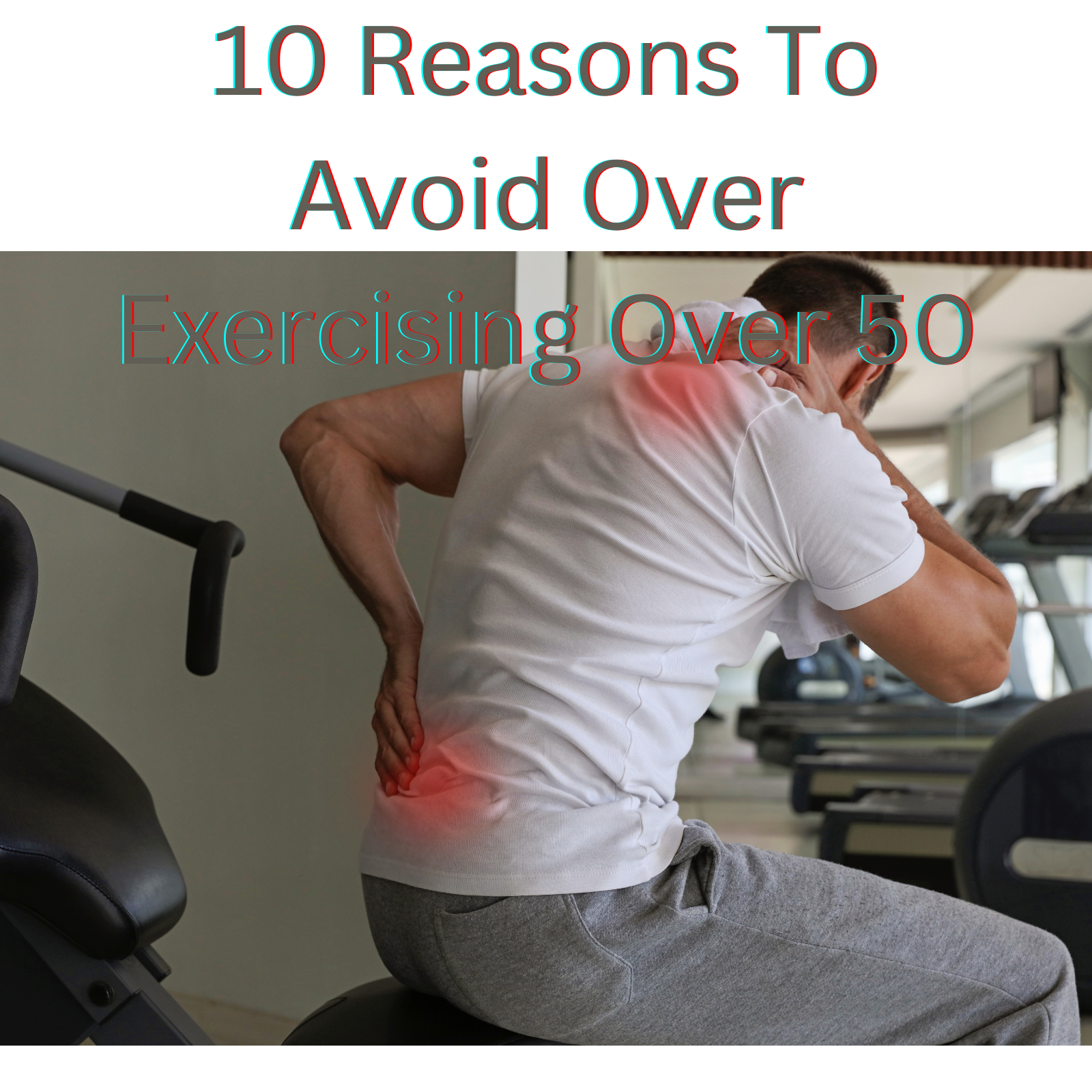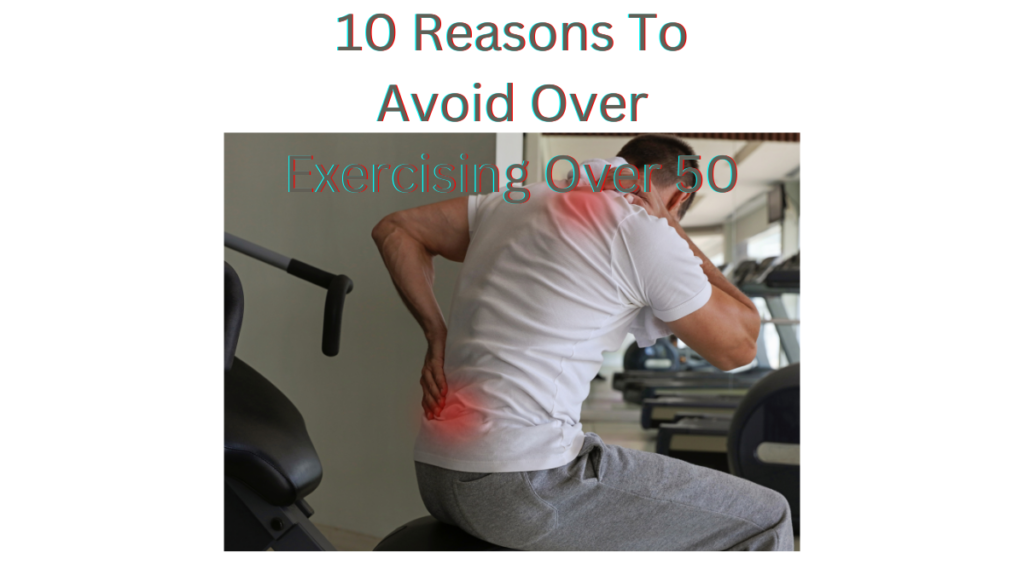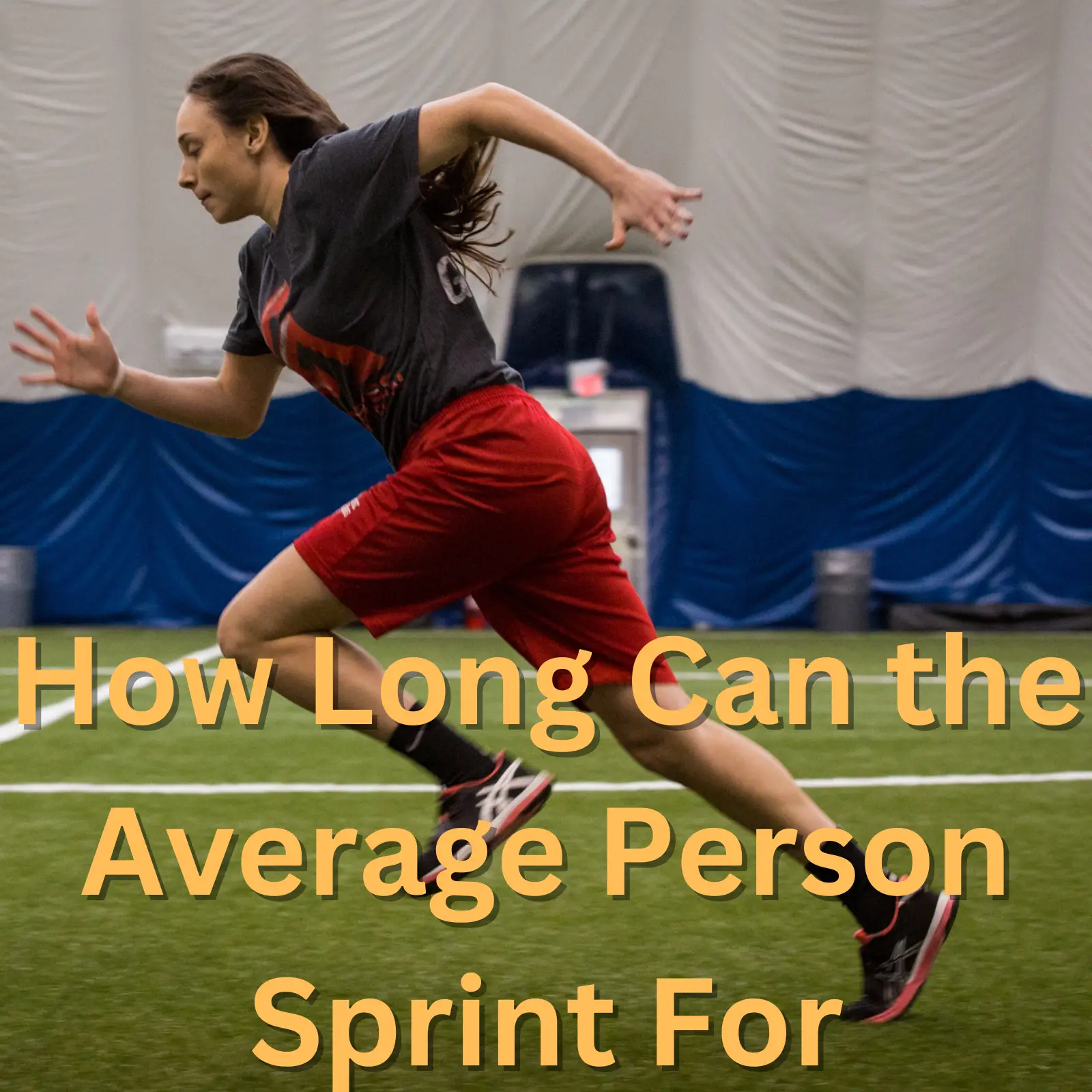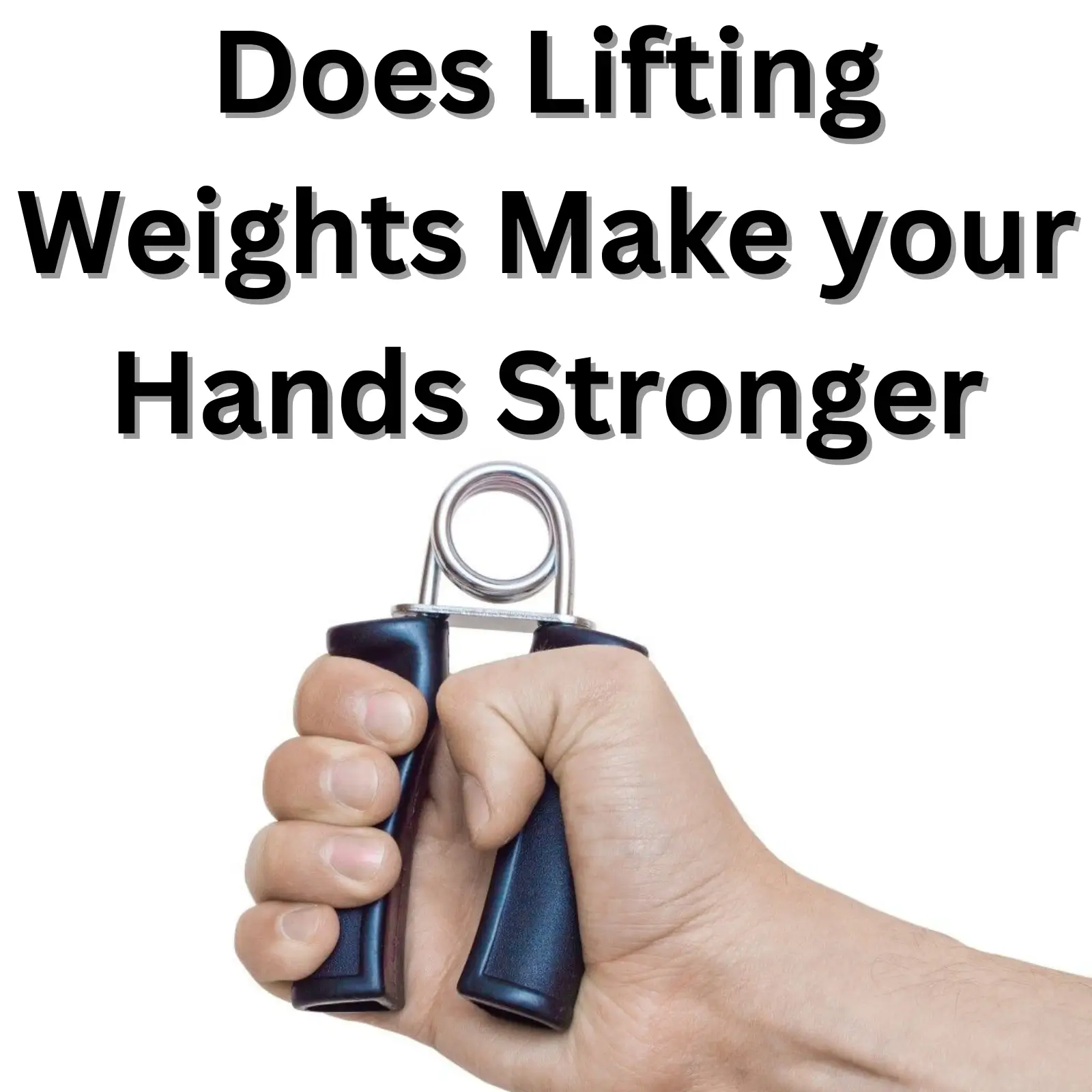
10 Reasons To Avoid Over Exercising Over 50
Introduction

10 Reasons To Avoid Over Exercising Over 50
Today we will go over 10 Reasons To Avoid Over Exercising Over 50. I will break it down with my personal experience and the lessons I learned while transitioning from my 30s to 40s and later into my 50s while exercising.
There’s definitely a learning a curve in all of the things but if you stay informed early on you can prevent a lot of things that happened to me. To quickly summarize I went through several injuries, reduced healing and even some form of chronic pain. Could all of this have been prevented? Perhaps some of it would if I knew certain things which I want to talk to you about in this article.
Please note I’m not a professional but I have had a lot of years of training with various personal trainers and I myself have been qualified to train others over the years. Having said that always consult with someone local where he can physically make the best determination and what’s ideal for your body build and age. These things will apply to the majority of people but not to everyone as we are all unique and in different physical conditions.
Avoiding Too Much Exercise Will Help You Age Gracefully
The benefits of exercise are well-documented, but it is important to avoid over-exercising, as this can lead to health problems later in life. Over-exercising can put strain on the heart and other organs, and can lead to injuries. It is important to find a balance in your exercise routine, and to listen to your body when it comes to rest and recovery. By avoiding over-exercise, you can help yourself age gracefully and stay healthy into your later years and avoid unnecessary injuries. Below I will go into more depth on some of those and why I think they are important to at least be aware off.
You Will Prevent Some Injuries
As we age, our bodies become more susceptible to injury. This is due to the natural deterioration of our bones, muscles, and connective tissues. However, there are several things we can do to help prevent injuries as we get older.
- One of the best ways to prevent injuries is to stay active and maintain a healthy lifestyle. Exercise helps keep our bones and muscles strong, and it also helps improve our balance and coordination. Additionally, eating a healthy diet helps to ensure that our bodies have the nutrients they need to function properly.
- Another way to prevent injuries is to be aware of our surroundings and take precautions when necessary. For example, if we are walking on icy sidewalks, we should wear proper footwear to avoid slipping and falling. Similarly, if we are lifting heavy objects, we should use proper form to avoid strain or injury.
- Finally, it is important to listen to our bodies and be aware of any pain or discomfort we may be experiencing. If we feel pain, we should stop what we are doing and rest. If the pain persists, we should see a doctor to rule out any serious injuries.
By following these simple tips, we can help prevent injuries as we age.
Over Exercising Will Lead To Burnout and Fatigue
If you’re not careful, over-exercising can lead to burnout and fatigue. It’s important to find a balance between pushing yourself to reach your fitness goals and giving your body the rest it needs to recover. Otherwise, you risk putting your health at risk.
Over-exercising can lead to a number of problems, including:
- Increased risk of injury
- Decreased performance
- Impaired recovery
- Fatigue
- Burnout
- Depression
If you find that you’re struggling to keep up with your usual workout routine, or you’re feeling unusually tired, it’s important to take a step back and reassess your training. You may need to cut back on the intensity or frequency of your workouts, or take a few days off altogether.
It’s also important to make sure that you’re eating a balanced diet and getting enough sleep. These are both crucial for recovery and will help you avoid burnout.
If you think you might be over-training, or you’re just not feeling like yourself, it’s important to talk to a doctor or certified athletic trainer. They can help you assess your situation and make recommendations for how to get back on track.
It Can Cause Joint Problems
Many people enjoy working out at the gym, but few are aware of the potential risks associated with weightlifting. One such risk is joint problems, which can be exacerbated by pre-existing joint issues.
This can get worst if you are pre-disposed genetically to have joint issues. Generally exercising specific joint groups can amplify the effect and lead to a lot of problems. So if you have history of joint issues take extra precautions of what exercise routine you are following.
Weightlifting puts a lot of stress on the joints, and this can lead to pain and inflammation. If you have existing joint problems, then weightlifting can make them worse. It is therefore important to be aware of the risks before starting any new exercise regime.
If you do have joint problems, there are some things you can do to help reduce the risk of further damage. For example, you can lift lighter weights, use proper form, and warm up before lifting. You should also talk to your doctor or a physical therapist to see if weightlifting is right for you.
Overall, weightlifting can be a great way to get in shape, but it’s important to be aware of the risks. If you have joint problems, talk to your doctor before starting any new exercise program.
Physical Injuries
If you over-exercise, you could end up injuring yourself. This is because your body is not used to the high level of activity, and so it is more susceptible to injury. Over-exercising can also lead to dehydration, which can further increase your risk of injury. Therefore, it is important to make sure that you are staying hydrated and not pushing yourself too hard when you are working out.
So physical injuries can happen at any age group but you are more prone to them as you age due to the reasons we mentioned earlier. Furthermore you need to keep in mind that physical injuries if you are over 50 are going to be harder to heal so try to prevent them to begin with following a proper warm up routine and respecting your weight limits and endurance.
You Could Develop An Unhealthy Relationship With The Gym
You could develop an unhealthy obsession with exercise if you overdo it. This is because exercise releases endorphins, which have mood-boosting effects. Endorphins are also addictive, so the more you exercise, the more you may crave the feeling they provide.
If you find yourself exercising excessively or to the point of exhaustion, it’s important to take a step back and reassess your relationship with exercise. Make sure that you’re doing it for the right reasons, such as to improve your health or maintain your fitness level, and not just to chase the high that endorphins provide.
It’s also important to make sure that you’re not using exercise as a way to cope with negative emotions or as a form of self-punishment. If you find yourself feeling guilty or anxious if you miss a workout, or if you’re using exercise as a way to punish yourself for eating certain foods, then it’s time to reevaluate your relationship with exercise.
If you think you may be developing an unhealthy obsession with exercise, talk to your doctor or a mental health professional. They can help you assess your relationship with exercise and make sure that you’re staying healthy both physically and mentally.
You Can Get Dehydrated
Over-exercising can lead to dehydration and electrolyte imbalance. When you exercise intensely, your body loses fluids through sweating. If you don’t replace those fluids, you can become dehydrated. Dehydration can cause fatigue, muscle cramps, headache and dizziness. Electrolyte imbalance occurs when the levels of electrolytes in your body become too low or too high. This can also be caused by dehydration. Symptoms of electrolyte imbalance include muscle weakness, irregular heartbeat and confusion.
Typically I started noticing this more on the summer and hot days where basically I used to sweat more than usual. So be careful as this can end up being life threatening depending on your environment and physical conditions. Luckily there’s an easy fix for this just drink a lot of water or even water infused with electrolytes and try to keep a slightly higher than usual salt content in your diet the days you work out to preserve more minerals in your body as they get expelled during exercise.
It Can Weaken Your Immune System
Your immune system is your body’s natural defense against infection and illness. Working out over 50 puts a bit of strain in our immunity but overall makes it stronger. However the times you overdo it with exercise you give an opening to opportunistic bacteria and viruses to attack your immunity. When your immune system is weakened, you are more susceptible to getting sick. There are many things that can weaken your immune system, including stress, lack of sleep, and poor nutrition.
If you want to stay healthy, it’s important to take care of your immune system. Here are some tips:
- Get enough sleep, sleep is important for overall health, and it can also help boost your immune system.
- Eat a healthy diet. A healthy diet is important for overall health, and it can also help boost your immune system.
- Reduce stress. Stress can weaken your immune system, so it’s important to find ways to relax and de-stress.
- Exercise regularly. Exercise can help boost your immune system, but don’t overdo it as we mentioned earlier it can be bad
- Avoid tobacco and excessive alcohol when working out
If you take care of your immune system, you’ll be less likely to get sick. So make sure to get enough sleep, eat a healthy diet, reduce stress, exercise regularly, and avoid tobacco and excessive alcohol.
Recovery Will Be Slower
As we age, our bodies change and don’t recover from intense workouts as quickly. When we are over 50, we may not be able to recover from intense workouts as quickly. This is because our bodies are not able to produce the same amount of collagen and elastin. These are the proteins that help our skin to repair itself. As we age, our skin becomes thinner and less elastic. This means that it takes longer for our skin to heal from cuts, scrapes, and bruises.
Our bones also become more brittle as we age. This means that they are more likely to break or fracture if we fall or have an accident. Our muscles also tend to shrink and weaken as we age. This can make it harder to recover from a strenuous workout.
It’s important to listen to our bodies as we age and to take things slow. We shouldn’t push ourselves too hard when working out. We should also make sure to warm up and cool down properly. And, we should always consult with our doctor before starting any new exercise routine.
Excessive Exercise Might Shorten Your Life Expectancy
There’s a lot of studies starting to show that exercise at a higher stress level may be negative indeed for your health rather than doing you good. The reasons for these could be a lot but I think as Lindios an ancient Greek philosopher said everything in moderation is good and the same applies here too.
There are a few reasons why excessive exercise might shorten your life expectancy.
- First, if you are exercising to the point of exhaustion, you are putting a lot of stress on your body. This can lead to injuries, and over time, these injuries can take their toll.
- Second, if you are not getting enough rest or recovery time, your body will not be able to repair itself properly, and this can also lead to injuries.
- Third, if you are not eating a balanced diet, you may not be getting all the nutrients your body needs to function properly. This can lead to fatigue, and over time, it can weaken your immune system and make you more susceptible to illness.
So, while exercise is important for overall health, it is important to find a balance. Too much of anything is never a good thing, and this includes exercise. Find an activity that you enjoy and that gives you a good workout, but don’t overdo it. And be sure to give your body the rest and recovery time it needs. Lastly, eat a healthy diet to make sure your body has all the nutrients it needs to function properly. By following these tips, you can help ensure that you live a long and healthy life.
Conclusion
If you enjoyed 10 Reasons To Avoid Over Exercising Over 50 please drop me a cheer below I would appreciate it.
Do you exercise moderately at the age of 50 and above?
You can find some similar articles I wrote here:
Besides my personal experiences I also referenced some studies which you can find below:
You may also like

What Percent of Adults Can Bench 315

How Long Can the Average Person Sprint For

Does Lifting Weights Make your Hands Stronger
Archives
- January 2026
- December 2025
- November 2025
- October 2025
- September 2025
- August 2025
- January 2024
- October 2023
- September 2023
- August 2023
- July 2023
- June 2023
- May 2023
- April 2023
- March 2023
- February 2023
- January 2023
- December 2022
- November 2022
- October 2022
- September 2022
- August 2022
- June 2022
- May 2022
- April 2022
- March 2022
- January 2022
- December 2021
- November 2021
- October 2021
- August 2021
- November 2020
- July 2020
- May 2020
- April 2020
- March 2020
- August 2018
- July 2018
- June 2018
- April 2018
- March 2018
Categories
- Aftercare Procedures
- Age Groups
- AI/ML
- Alternative Medicine
- Ambient Computing
- Animal Health
- Animal Husbandry
- Animals
- Anti-Aging
- Architectural Design
- Art And Technology
- Auditory Science
- Augmented Reality
- Automation
- Babies
- Baby
- Beauty & Skincare
- Biohacking
- Biomechanics
- Book Reviews
- Breastfeeding
- Budgeting
- Budgeting Strategies
- Business
- Cardiovascular Health
- Career Advice
- Career Development
- Career Growth
- Cats
- Chess
- Chronobeauty
- Circular Economy
- Civic Technology
- Cleaning Tips
- Cloud Computing
- Cognitive Health
- Cognitive Performance
- Cognitive Science
- Community
- Community Building
- Community Engagement
- Community Living
- Computer Vision
- Consumer Guides
- Consumer Trends
- Container Gardening
- Content Analysis
- Content Non-Technical
- Content Strategy
- Cosmetic Chemistry
- Cultural Events
- Cycling
- Data Analysis
- Data Engineering
- Data Science
- Database
- Design Psychology
- Design Trends
- Developer Productivity
- Diet
- Diet
- Digital Identity
- Digital Media
- Digital Wellbeing
- DIY
- DIY Projects
- Dogs
- Engineering Culture
- Entertainment News
- Environmental Impact
- Environmental Science
- Equity Compensation
- Ethical AI
- Exercise
- Exercise Science
- Exercise Technique
- Exotic Pets
- Fall Gardening
- Family
- Family Health
- Family Life
- Fashion Business
- Fashion Industry
- Fashion News
- Fashion Tech
- Financial Analysis
- Financial Optimization
- Financial Planning
- Flooring Maintenance
- Food
- Food Psychology
- Food Safety
- Food Tech
- Functional Fitness
- Functional Training
- Future Of Work
- Garden Care
- Garden Maintenance
- Gardening Tips
- Geospatial Data
- Gig Economy
- Greece
- Greek
- Greek Food
- Green Technology
- Gymnastics
- Hardware Engineering
- Health
- Health And Wellness
- Health Informatics
- Health Science
- Health Tech
- Healthcare Management
- Healthy Eating
- Healthy Recipes
- Holistic Health
- Holistic Wellness
- Home & Living
- Home Decor
- Home Financing
- Home Health
- Home Improvement
- Home Maintenance
- Home Organization
- Home Styling
- Horticulture
- Household Chemistry
- Identity Management
- Industrial Design
- Industry Analysis
- Infant Nutrition
- Infrastructure Management
- Ingredient Deep Dive
- Integrative Health
- Integrative Medicine
- Interior Design
- Internet of Things
- Internet of Things (IoT)
- Invalid Request
- Investment Strategies
- Investment Strategy
- IoT
- Kids
- Leadership Development
- Learning Strategies
- Lifestyle
- Lifestyle Brands
- Lifestyle News
- Lifestyle Optimization
- Literary Criticism
- Literature
- Logistics Management
- Material Science
- Materials Science
- Meal Planning
- Media Analysis
- Meditation
- Mental Health
- Mental Performance
- Mental Wellness
- Miami
- Miami Food
- Mind And Body
- Minimalism
- Mobile Development
- Neuroscience
- No Applicable Categories
- Nutrition
- Nutrition News
- Open Source
- Operating Systems
- Operational Resilience
- Opinion
- Organization Tips
- Outdoor Living
- Over 40
- Over 50
- Over 60
- Parenting
- Parenting
- Parenting Strategies
- Performance
- Performance Optimization
- Personal Development
- Personal Finance
- Personal Growth
- Personal Productivity
- Pet Care
- Pet Safety
- Philosophy
- Politics
- Productivity
- Productivity Engineering
- Protein
- Psychology
- Psychology of Space
- Reading Culture
- Real Estate Investment
- Recipes
- Regulatory Compliance
- Remote Work
- Renovation Planning
- Resource Management
- Respiratory Health
- Responsible Pet Ownership
- Retail Strategy
- Robotics
- Science
- Seafood
- Seasonal Gardening
- Security
- Sedentary Health
- Self-Care
- Skincare Science
- Skincare Trends
- Sleep
- Sleep Health
- Smart Home
- Smoothies
- Social Impact
- Soft Skills
- Soil Health
- Spatial Computing
- Spatial Design
- Stress Management
- Supplements
- Sustainability
- Sustainability Science
- Sustainable Engineering
- Sustainable Fashion
- Systems Engineering
- Tax Optimization
- Tax Strategy
- Tech Investment
- Travel
- Travel News
- Travel Safety
- Travel Tips
- Trend Analysis
- Uncategorized
- Urban Gardening
- Urban Planning
- User Experience
- Veggie
- Vietnam
- Virtual Events
- Volunteering
- Wealth Management
- Wearable Technology
- Wellness
- Wellness Technology
- Winter Gardening
- Work-Life Balance
- Workplace Culture
- World
- Writing
- Writing Skills
- Year In Review
- Yoga News
- Zero Waste
